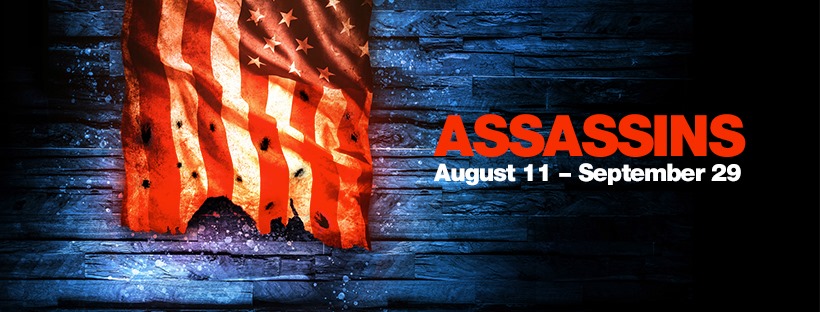Just a single little finger can change the world.
9— Dayton, Ohio August 4, 2019
22— El Paso, Texas August 3, 2019
3— Gilroy, California July 28, 2019
34 people dead from just a single little finger.
Something just broke.
It’s the strap-line for Stephen Sondheim’s Assassins now open and running at Signature Theatre in Shirlington, Virginia. And they’re not wrong. Something just broke; our country, divided and broken by gun violence, so what better a time to staunchly promote a musical whose essence is derived from exactly that? It may seem counterproductive, it may even seem insensitive, but what Signature Theatre is presenting with this production of Assassins is a much-needed reflective look at gun culture in America and how we got to where we are. You can’t really solve a problem without first identifying where it originated; Signature Theatre is displaying exactly that in this powerfully performed production of Assassins.
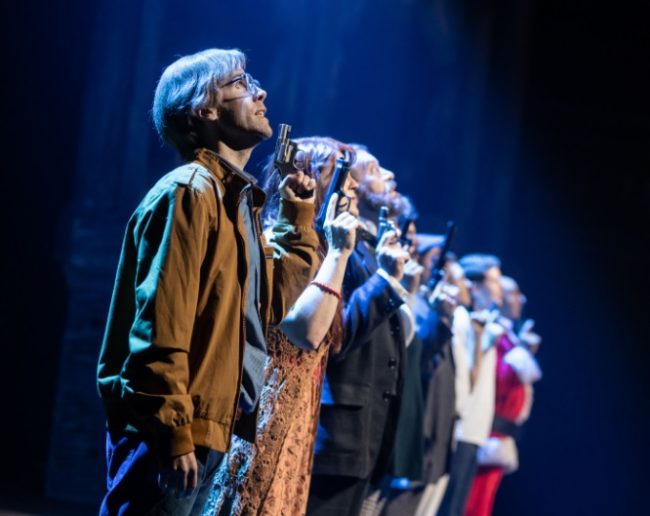
Directed by Eric Schaeffer with Musical Direction by Jon Kalbfleisch, there are statements to be made with a potent and potentially political production like Assassins, and although the take-home message for every individual in attendance may vary, it is clear that Schaeffer is setting out to reflect on the vainglorious nature of presidential assassination and the overwhelming self-worth derived from such an act. With a practically flawless casting of principles and ensemble alike, Schaeffer’s scope of understanding is deceptive in its simplicity; there is depth to the emotional current of the performance.
Musically the show is quite stunning. Jon Kalbfleisch brings a superb blend of sounds together from the ensemble (Jimmy Mavrikes, Christopher Mueller, Nova Y. Payton, Christopher Michael Richardson, Maria Rizzo) whenever their supportive vocals are called for. There are moments, however, during “Something Just Broke” where the pop-modern vibrato resonance of Nova Y. Payton fails to blend cleanly with the rest of the stylized sounds that Kalbfleisch meticulously spins together, but an instance like this is almost forgettable because of all of the clear, clean harmonies that Kalbfleisch coaxes out of the ensemble and principles throughout the rest of the production, creating stirring moments that evoke deep pathos in the audience.
The decrepit ruins of Ford’s Theatre is a haunting touch that Scenic Designer James Kronzer layers into the set development of Assassins. It creates an eerie sense of place for an otherwise hollow stage, which is backed and flanked by derelict, crumbling interior walls. Kronzer’s vision of the set becomes clear near the production’s conclusion, showing the audience where these assassins have been all along, building up to the moment that defines history for their psychologically disturbed collective. His gently wafting staircase, winched down and up again for the big-show number, “The Ballad of Guiteau” is a marvel, crafted in a fashion that encourages the illusion of heaven floating down to welcome Charles Guiteau before he goes all “Danny Kaye” up and down said steps. The fluidity and overall momentum of the production is smart, sharply kept in line by ease of Kronzer’s moving set pieces.
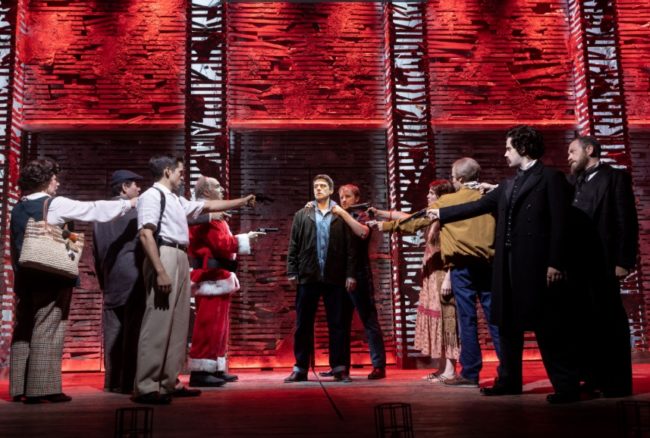
Chris Lee’s lighting in this production is remarkable. Often times it’s a lack of lighting or as specific focal point created by a singularly focused light that draws the audience’s attention to the emotional intensity of an exacting moment; Lee masterfully executes these all with well-placed cues and a keen understanding of how to enhance and influence emotional expression on the stage through illumination without overwhelming or overbearing it. The extremely basic principle of dimmed strobing at the end of “How I Saved Roosevelt” creates a shocking moment for the audience (combined with the intensely stricken physicality of a particular actor along with his vocal prowess in that moment.) The unsettling spotlight that falls upon Charles Guiteau at the beginning of “The Ballad of Guiteau” amplifies the acapella, echoing start of the number in a way that sends shivers up the spine.
Complimenting the production’s aesthetics, Sound Designer Ryan Hickey has precision cues that land flawlessly on their mark. When a glass is dropped behind the “Assassins Bar in Limbo-Hell” the jumpy, shattering sound effect that follows is pristine. The sound balance throughout the production is perfect, keeping musical levels just under the volume of the singers. Hickey’s work, though subtle, is an integral part of the cumulative experience presented in this production of Assassins.
Rarely is attention paid to the Wig Designer of any production, but attention must finally be paid to such a person, at least in regards to this production. Alison Samantha Johnson and Austin Blake Conlee go the extra mile to provide authentic-looking, carefully styled, and meticulously placed lace-front wigs upon characters to really settle them into their niche. The two most praiseworthy are the distressed, frazzled red locks seen on Squeaky Fromme and the manicured curly coif of John Wilkes Booth. It’s easy to muss a healthy wig and throw it on someone’s head, but Johnson and Conlee take care to give that fried, unkempt look to Squeaky Fromme’s hair piece without giving the character a slovenly appearance. And given the intimate distance of the actors to the first few rows of audience, Johnson and Conlee’s work is that much more appreciated for its professional appearance. Costume Designer Kathleen Geldard has followed suit, creating individual outfits that set not only the time and place for each assassin but their overall persona, recapturing the likeness of these characters from historical reality.
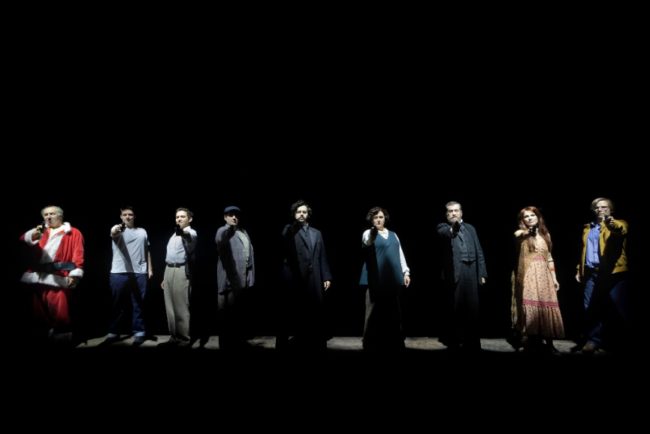
Where Eric Schaeffer missteps in this production is not in the overall concept, but rather his placement and use of The Proprietor (Kurt Boehm.) It is never clear what exactly this character is doing in this production. Boehm’s voice feels ill-suited for the opening number, “Everybody’s Got the Right” and he speak-sings through more than half of it, doing a disservice to the vocal talent that Boehm has delivered in other productions in and around the DC area. While Sondheim can initially be blamed for this character and his lack of overall inclusion in everything else that’s happening, Schaeffer fails to clearly identify a niche for Boehm’s Proprietor. The strangely gothic costuming with odd-placed fake tattoos does little to cement him into this vision.
What Schaeffer does manage to do exceptionally well, almost to a revolting fault, is to humanize these assassins. Deeply troubled, mentally disturbed, emotionally hopeless individuals are presented as raw, desperate humans who simply want the basics in life; how can you loathe someone who struggles so vehemently that their only out is to, as the lyrics say, “kill a president?” It forces the audience to grapple with their own concept of humanity, particularly in the wake of America’s three most-recent mass-shootings and the way the current political climate is approaching gun culture.
There is a staunch narrative figure that is birthed out of Sam Ludwig’s Balladeer. When he tackles “The Ballad of Booth”, Ludwig fulminates a journalistic anger, almost like he is aware that he’s meant to be an objective observer but just cannot contain his frustrations and furies. Ludwig has a stellar vocal range, perfect for the higher tenor construction of The Balladeer character. This is demonstrated with great success throughout the production. The twisting reveal of Ludwig transforming from storytelling Balladeer into Lee Harvey Oswald (despite being poorly executed physically due to Schaeffer’s muddied blocking choices of everyone else on the stage in that moment) is striking. The brazen confidence that Ludwig possesses as the Balladeer vanishes into the subdued ether of the Book Depository and that quaking fear of being a failure consumes his personage on the stage like a savage fever overtaking the brain in the throws of disease. His voice transforms wholly from one character to the other and the story takes a drastic shift from that moment forward.
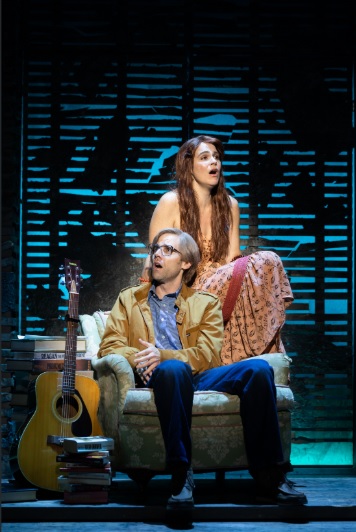
Evan Casey is fitted to look every bit the part of John Hinckley. Awkward, ashamed, disturbing, Casey fills the role well. And although he is only featured in one musical number, a duet— “Unworthy of Your Love”— shared with Squeaky Fromme (Rachel Zampelli), there is a tragically beautiful creature that is unearthed in that song. Casey’s vocals are the correct fit for the duet, and his sweet, troubled soul fills each line that he sings. Zampelli, as the brain-blitzed teenage despot in love with Charles Manson, is perfectly suited for the role. Her voice blends into group numbers without incident, and the harmonies she carries in her half of “Unworthy of Your Love” generate earnest feelings for that number. Her character choices and overall commitment level to Squeaky are vastly impressive, particularly in her more comic scenes with Sarah Jane Moore (Tracy Lynn Olivera) as she plays them quite seriously. Olivera, who is the epitome of failed-Narc-turned-wannabe-assassin, is quirky in her own right, provides pristine soprano sounds throughout the performance and just clicks into the character that she’s playing with ease. Her higher register sounds are much appreciated in the balanced barbershop-quartet styling of “The Gun Song” featuring Olivera, and three other assassins.
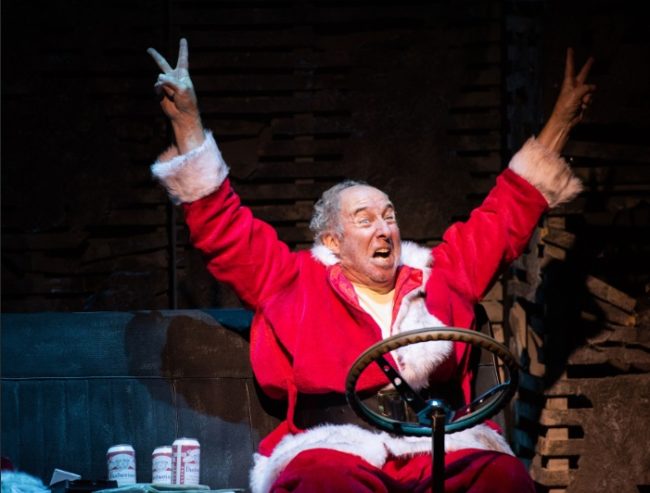
With an unsung solo voice, right up until “Another National Anthem”— which in its own right is a deeply disturbing song (not unlike something sinister from Into the Woods only with guns)— Christopher Bloch delivers a rendering of Samuel Byck that is both hilarious and unsettling. A part of that is the filthy Santa suit, but Bloch lives in the skin of the character so far beyond the suit that it crawls under the audience’s skin. There is a volatile component to Bloch’s portrayal of Byck that is tempered with humor but steeped in desperation— the unifying factor for these assassins, as made clear in Schaeffer’s vision for this production— that really grates against the sensitivities of those watching. It is more difficult to empathize and sympathize with a spastically furious character, but Bloch finds a way to push his character’s vulnerability to the forefront of his presentation. Surprisingly moving vocals are heard from Bloch during “Another National Anthem”, which make him a double-threat upon the stage.
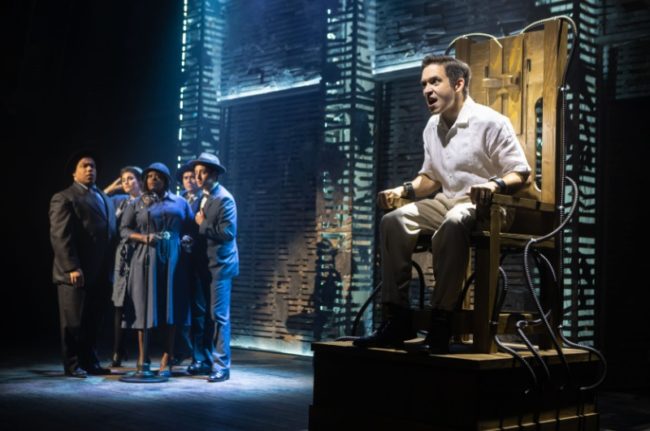
The immigrants Sondheim’s Assassins are presented no differently than our “American Home-Grown Terrorists” who pick up guns and shoot presidents. Schaeffer’s vision is much the same; he gives Leon Czolgosz (Lawrence Redmond) and Giuseppe Zangara (Ian McEuen) the same deep, empathizing qualities, the same hopeless, desperate needs as the others, and allows the audience to respond accordingly. Redmond delivers a harrowing solo during “The Gun Song”, and his interactions with the formative Emma Goldman (Maria Rizzo) are driven by this painfully human plea for connection. McEuen, as the meteoric Guiseppe Zangara, burns as bright as the fire in his belly, with a flawlessly composed Italian accent. With exacting precision in both McEuen’s vocal delivery of “How I Saved Roosevelt” and his facial expressions during the number, he fabricates an entire lifetime of one man’s struggles and delivers it phenomenally in one, short musical segment.
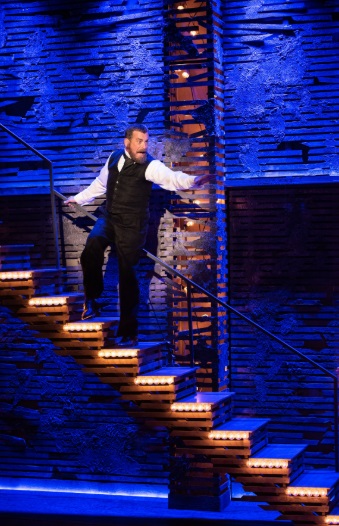
Going to the Lordy may be the least of Charles Guiteau’s (Bobby Smith) problems in this production once he successfully assassinates President James Garfield. (It’s not a spoiler; it’s history.) Smith, a known-quantity song-and-dance man in Washington DC, tackles the role with rigorous aplomb, crafting fine character work in this deeply off-kilter individual. It takes a tremendous calm to stand at the lip of down-stage center and point a gun directly into the audience at the best of times; add to that the recent mass-shootings and a commendable praise is given for that moment alone to Smith. “The Ballad of Guiteau”, arguably the “least Sondheim” of the numbers in the show, is a radiant burst of eccentricity that shakes the audience alive. With a haunting start, Bobby Smith’s voice swells in both volume and emotional capacity, filling the house with his rich, reverberant sound until the music accompanies him, shifting in tempo and tone. Possessed across the face with a maniacal hybrid of terror and glee as Smith parades up and down the staircase during this song, there is something unspeakably disturbing about the way he plays Guiteau, a true insight to the cracked and utterly maddened desperation of the man who just wanted to be Ambassador to France.
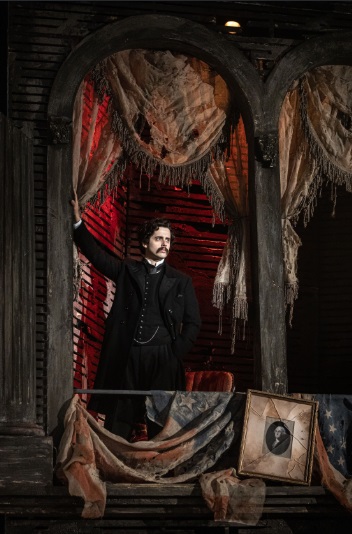
The glue, the pioneer, the ground-zero assassin, John Wilkes Booth (Vincent Kempski) is the catalyst behind the production. With a patois and cadence befitting a raging disgruntled gentleman of the south circa 1865, Kempski is a divine double-slung threat upon the stage as John Wilke Booth. The accent is honed, the vocals are primed, even the way he leaps from the balcony appears to happen in methodic slow-motion. Kempski has a bombastic moment just after “Another National Anthem” where he confronts Lee Harvey Oswald and the litany of explosive things that fly from his mouth at a breakneck pace are frightening. Kempski has gorgeous, glistening vocals presented all throughout “The Ballad of Booth” and every other instance of his singing. He is the motivating factor, the driving force, and the unification that brings these assassins together, insisting that Lee Harvey Oswald is the lynchpin in keeping them that way. It is a stellar performance given by Vincent Kempski in this role.
It is a lot to digest; it is much to consider. Everybody’s got the right, as Sondheim says. To sunshine…to a gun…to happiness…and it’s still within everybody’s rights to go out and attend live theatre. It is an experience, and the right moment to experience it, Signature’s Assassins. Don’t miss this landmark occasion, the 30th Sondheim in 30 seasons and what more relevant a Sondheim to produce at this moment in time than Assassins?
Running Time: Approximately 95 minutes with no intermission
Assassins plays through September 29, 2019 in the Max Theatre at Signature Theatre— 4200 Campbell Avenue in Shirlington, VA. For tickets call the box office at (703) 820-9771 or purchase them online.

